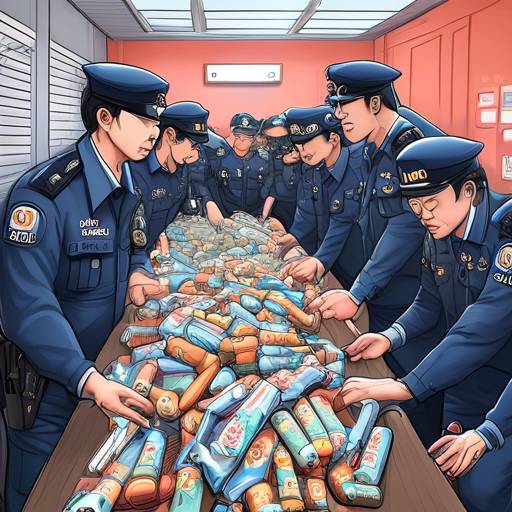South Korean Police Crack Down on Crypto-powered Drug Trafficking
South Korean police have been actively combating drug trafficking facilitated by cryptocurrencies, with a total of 452 arrests made between June 2022 and December 2023 in Seoul alone. During this period, three suspected drug dealers were apprehended, along with 445 buyers and four illegal crypto trading platform operators.
An Uphill Battle Against Crypto-powered Drug Crime
The South Korean police have been battling against what politicians have labeled as an “epidemic” of youth involvement in crypto-powered drug trading. The majority of those arrested were between the ages of 20 and 39, with five teenagers also charged. While previous arrests related to crypto-powered drug trafficking have been made across the country, this is the first time that officers have successfully shut down an illegal crypto exchange operated by narcotics-related gangs.
Key points to note:
- 452 people were arrested in Seoul for crypto-powered drug trafficking from June 2022 to December 2023.
- Three suspected drug dealers, 445 buyers, and four illegal crypto trading platform operators were apprehended.
- South Korea is struggling with a significant increase in youth involvement in crypto-powered drug trading.
- The majority of those arrested were aged between 20 and 39, with five teenagers also charged.
- This is the first time that officers have successfully shut down an illegal crypto exchange run by narcotics-related gangs.
Crypto Monitoring Tools Aid Police Investigations
The head of the First Drug Crime Investigation Department at the Seoul Metropolitan Police Agency, Nam Sung-shin, explained that officers utilized cryptocurrency and blockchain monitoring tools to identify suspects involved in drug trafficking. By tracing the cryptoassets sent to the sellers’ wallet addresses, the police were able to track down and arrest a significant number of individuals involved in these illegal activities.
Key points to note:
- South Korean police used crypto and blockchain monitoring tools to identify suspects involved in drug trafficking.
- The tracing of cryptoassets sent to sellers’ wallet addresses played a crucial role in tracking down suspects.
- These monitoring tools enabled the police to make a large number of arrests.
- Many individuals mistakenly believe that using the dark web or certain chat apps can guarantee anonymity, but experienced investigators are constantly working to track down drug offenders.
Regulatory Measures Against Crypto Trading Platforms
The South Korean police have charged four suspected operators of a virtual asset trading agency with violations of the Specific Financial Information Act. This act requires all cryptocurrency exchanges and wallet operators to obtain operating licenses from the regulatory Financial Intelligence Unit. Currently, only five domestic crypto exchanges that are part of an association called DAXA have received the necessary permits for KRW-crypto trading.
Key points to note:
- South Korean police have charged four suspected operators of a virtual asset trading agency with violations of the Specific Financial Information Act.
- The act mandates that all crypto exchanges and wallet operators obtain operating licenses from the regulatory Financial Intelligence Unit.
- Only five domestic crypto exchanges have received the necessary permits for KRW-crypto trading.
Hot Take: South Korean Police Clamp Down on Crypto-powered Drug Trafficking
The South Korean police are actively combatting drug trafficking facilitated by cryptocurrencies, especially among the youth population. By utilizing crypto and blockchain monitoring tools, they have been successful in identifying suspects and making a significant number of arrests. However, the battle against crypto-powered drug crime remains an ongoing challenge for law enforcement agencies. Regulatory measures, such as the Specific Financial Information Act, aim to control and regulate crypto trading platforms to prevent their misuse in illegal activities.





 By
By
 By
By
 By
By
 By
By
 By
By